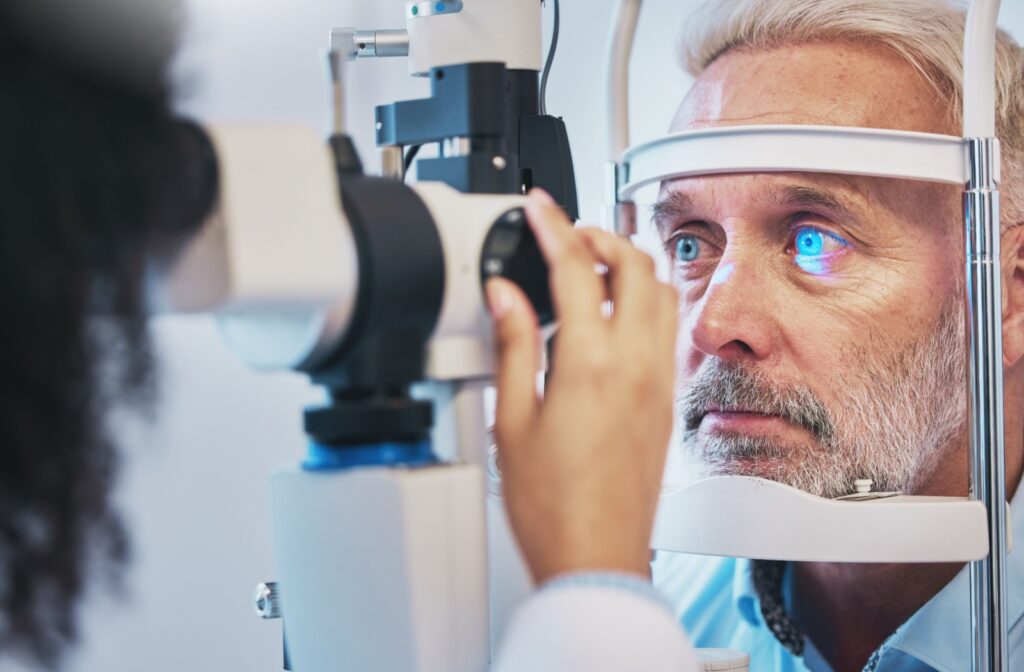If you happen to have blue eyes and have noticed squinting or discomfort in bright sunshine, you’re not imagining things. Light sensitivity and eye color are connected, and those of us with blue, green, or other light-colored eyes may have a bit more trouble dealing with intense sunlight.
You can protect your light-sensitive eyes by wearing polarized sunglasses, getting regular eye exams, and getting anti-glare coatings added to your prescription eyeglasses.
Why Are Blue Eyes More Sensitive to Light?
The key factor here is melanin, the pigment responsible for giving our eyes, skin, and hair their color. Your eye color depends on the amount and distribution of melanin in the iris. People with darker eyes have more melanin, which acts as a natural filter, protecting against bright light and harmful ultraviolet (UV) rays.
Blue and other light-colored eyes, on the other hand, naturally contain less melanin. With less pigment to block and absorb light, blue-eyed individuals are more sensitive to glare and bright environments.
What Role Does Melanin Play in Eye Health?
Melanin doesn’t just influence eye color; it also provides significant benefits, including:
- Protection against UV damage: Melanin absorbs and disperses harmful UV rays, reducing the risk of eye conditions like cataracts and macular degeneration.
- Minimizing oxidative stress: Melanin helps combat damage caused by free radicals, particularly in the sensitive tissues of the retina.
With less melanin, blue-eyed individuals may experience increased light sensitivity. However, the iris and pupil help regulate the amount of light entering the eye, and there are plenty of lifestyle adjustments to help out as well.
Other Causes of Light Sensitivity
Light sensitivity can be caused by a variety of factors beyond eye color. Here are some common causes to be aware of:
- Migraines: Sensitivity to light is a frequent symptom during migraine episodes.
- Eye strain: Prolonged screen time or intense focus can lead to discomfort and increased light sensitivity.
- Certain conditions: Issues like concussions, meningitis, or iritis can contribute to heightened light sensitivity.
- Medications: Some drugs, including antibiotics or diuretics, list light sensitivity as a side effect.
- Eye injuries: Trauma to the eye can temporarily increase sensitivity to light.
How Light Sensitivity Affects Eye Health
Light sensitivity might seem like a manageable inconvenience, but it can have implications for long-term eye health.
- Higher risk of UV-related damage: Prolonged exposure to UV rays can increase the chances of cataracts and other eye conditions.
- Potential for macular degeneration: People with light-colored eyes have a slightly higher likelihood of developing macular degeneration, a condition affecting central vision.
- Discomfort and strain: Constant exposure to intense light can lead to headaches, squinting, and eye strain.
But before you’re tempted to dim every light or avoid the outdoors, know that there are simple, effective ways to manage light sensitivity and protect the health of your eyes.
Practical Eye Care Tips for People with Blue Eyes

You don’t need to shy away from bright environments if you have light-sensitive eyes. Here are some proactive steps to help you stay comfortable and protect your vision.
Wear Polarized Sunglasses
A high-quality pair of polarized sunglasses is a game-changer for anyone with light-colored eyes. Good sunglasses reduce glare, filter out harmful UV rays, and keep your eyes comfortable in bright sunshine or during outdoor activities like hiking or driving.
What to look for in sunglasses:
- 100% UVA and UVB protection
- Polarized lenses to cut down on reflected light
- Large or wraparound styles to provide ample coverage
Add Anti-Reflective Coatings to Glasses
If you wear prescription glasses, ask about anti-reflective (AR) coatings. These coatings reduce glare from sources like overhead lighting, screens, and vehicle headlights, easing light sensitivity in both indoor and outdoor settings.
Schedule Regular Eye Exams
Keeping up with routine eye exams is essential, regardless of your eye color. However, if you have blue eyes, regular check-ups help detect and address potential issues related to light sensitivity, UV damage, or other conditions like macular degeneration.
Keep Your Eyes Moisturised
People with light-colored eyes often experience dryness, which can worsen sensitivity to light. Use lubricating eye drops, stay hydrated, and create a healthy indoor environment with proper humidity control.
Stay On Top of Your Eye Health
Having blue eyes doesn’t mean you need to avoid bright light or worry about your overall vision health. By practicing these simple tips and staying mindful of your environment, you can protect your eyes and enjoy the unique beauty of your light-colored irises. At the Eye Care Center of Colorado Springs, our mission is to help individuals with all eye colors and sensitivities maintain healthy, comfortable vision. Schedule your next eye exam today, and take the first step toward clear, protected vision.


